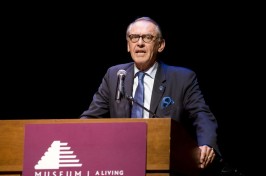 Deputy Secretary-General Jan Eliasson addresses a UN-organized event held to mark the centenary of the birth of Swedish diplomat Raoul Wallenberg. Photo: Melanie Einzig
Deputy Secretary-General Jan Eliasson addresses a UN-organized event held to mark the centenary of the birth of Swedish diplomat Raoul Wallenberg. Photo: Melanie Einzig20 September 2012 – Senior United Nations officials have paid tribute to the life and legacy of Raoul Wallenberg, a Swedish diplomat who rescued Jews from Hungary during World War II, describing his actions as an example for others to follow.
“Raoul Wallenberg was a young diplomat who can be admired for ingenuity and quick action saving Jewish lives in Budapest 1944 – diplomats today should follow his lead,” the Deputy Secretary-General, Jan Eliasson, said on Wednesday night at a special event at New York’s Museum of Jewish Heritage: A Living Memorial to the Holocaust, held to examine the diplomat’s mysterious disappearance at the end of World War II and his legacy.
Marking the centenary of his birth, co-sponsored by the Permanent Missions of Hungary and Sweden to the United Nations and the museum, and organized by the UN Department of Public Information’s (DPI) Holocaust and the United Nations Outreach Programme, the event featured a discussion involving authors Kati Marton and Professor Bengt Jangfeldt, both of whom have published books on the life of Mr. Wallenberg.
Born in August 1912, Mr. Wallenberg was recruited by the United States War Refugee Board in June 1944 to travel to Hungary, which had been aligned with the Axis powers. Given diplomatic status by Sweden, his task was to do what he could to assist and save Hungarian Jews.
Despite a complete lack of experience in diplomacy and clandestine operations, he led one of the most extensive and successful rescue efforts during the Holocaust. When Soviet forces liberated Budapest, the Hungarian capital, in February 1945, more than 100,000 Jews remained – mostly because of the efforts of Wallenberg and his colleagues.
“Wallenberg lived up in reality to the unbearable pity for the suffering of mankind,” Mr. Eliasson – paraphrasing philosopher Bertrand Russell – said in his remarks at the event’s opening. “But he certainly did not show any anguish or despair when it came to take action to help many survive.”
Addressing the same gathering, the UN Under-Secretary-General for Communications and Public Information, Peter Launsky-Tieffenthal, spoke of the example the Swedish diplomat had set for others.
“Raoul Wallenberg was willing to fight for what he knew to be right – to defend the lives and dignity of fellow human beings – at any cost,” Mr. Launsky-Tieffenthal said. “We are all tested on a daily basis. Often it is difficult to take a stand. How would I have reacted then, under the worst of circumstances?”
“Raoul Wallenberg’s actions were guided by his compassion for others,” he added. “It is my hope that his shining example will also guide me in my life.”
The Wednesday night event was one of many activities organized by the Holocaust and the United Nations Outreach Programme to encourage education about and remembrance of the Holocaust to help prevent future acts of genocide.
“UN Secretary-General Ban Ki-moon recently said, ‘However painful, remembering the Holocaust and educating future generations is essential to overcoming prejudice, hatred and human rights abuses.’ And this is the objective of the United Nations outreach programme on the Holocaust,” noted Mr. Launsky-Tieffenthal.
The Outreach Programme’s activities include producing online and print educational materials, holding seminars and exhibitions, screening films and the holding the annual worldwide observance of the International Day of Commemoration in Memory of the Victims of the Holocaust on 27 January each year.
